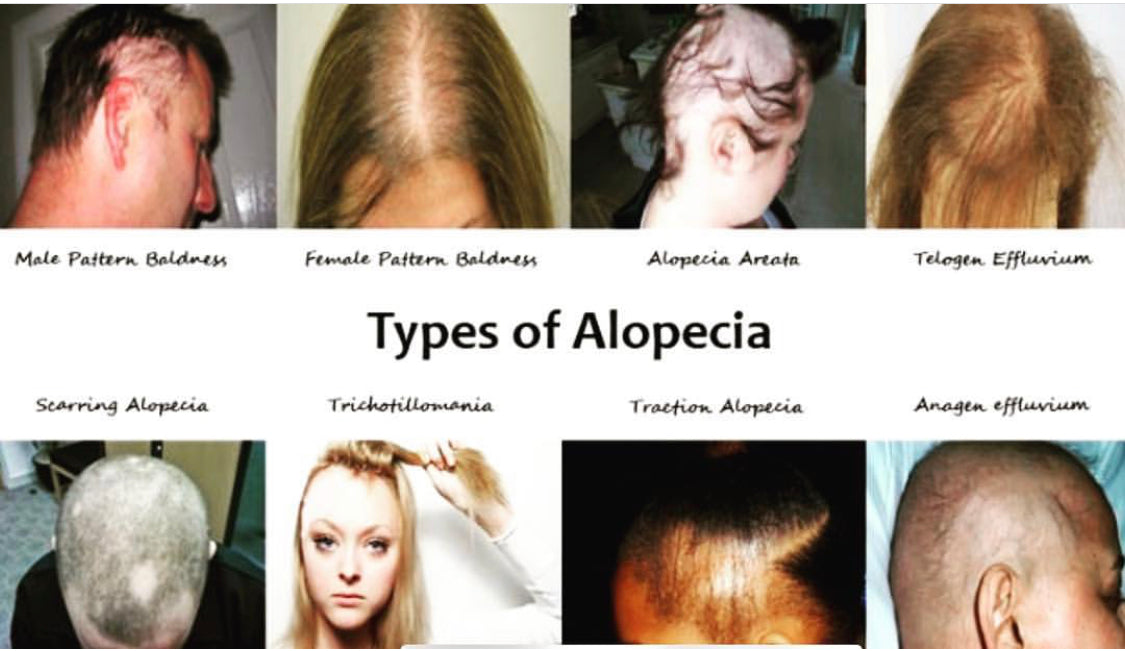The Different Types of Alopecia (Hair Loss)

When we think about hair loss, we often imagine one simple scenario: thinning hair or bald spots. But the reality is much more complex. Alopecia is the medical term for hair loss, and it comes in several different forms—some temporary, some permanent. Understanding these differences is the first step in learning how to treat and manage them.
Nonscarring Alopecia
This type of hair loss does not permanently damage the hair follicle, which means regrowth is often possible.
1. Alopecia Areata
An autoimmune disorder where the body mistakenly attacks hair follicles, leaving behind smooth, round bald patches.
• Patchy Alopecia Areata: Small, round bald spots.
• Alopecia Totalis: Complete loss of hair on the scalp.
• Alopecia Universalis: Loss of all body hair.
Hair may regrow in many cases, but the pattern can be unpredictable.
2. Androgenetic Alopecia (Pattern Baldness)
• In men: Hair typically recedes at the temples and crown.
• In women: Hair thins across the scalp but usually without a receding hairline.
This hereditary type is one of the most common worldwide.
3. Diffuse Patterned vs. Diffuse Unpatterned Alopecia
• DPA: Thinning at the crown and front with some stable hair at the back.
• DUPA: Widespread thinning with no permanent zone of dense hair.
4. Telogen Effluvium
A sudden shedding of hair often caused by stress, illness, medication, or hormonal changes. Luckily, it’s usually temporary once the underlying trigger is resolved.
5. Traction Alopecia
Hair loss caused by repeated pulling from tight hairstyles like braids, ponytails, or extensions. If caught early, hair can regrow.
6. Frictional Alopecia
Loss from constant rubbing (e.g., hats, helmets, or pillow friction). Recovery depends on the extent of follicle stress.
Scarring Alopecia (Cicatricial Alopecia)
Unlike nonscarring forms, scarring alopecia destroys the hair follicle and replaces it with scar tissue. This makes hair loss permanent if untreated.
Types of Scarring Alopecia
• Lichen Planopilaris: Inflammatory patches that can scar over.
• Discoid Lupus Erythematosus: An autoimmune condition causing scaly, scarred scalp lesions.
• Folliculitis Decalvans: Chronic follicle inflammation with pustules and scarring.
• Dissecting Cellulitis of the Scalp: Painful lumps and bumps that eventually scar.
• Frontal Fibrosing Alopecia: Receding hairline and eyebrow loss, common in women after menopause.
• Central Centrifugal Cicatricial Alopecia (CCCA): Begins at the crown and spreads outward, often seen in Black women and sometimes linked to certain styling practices or products.
Why This Matters
Hair loss can take a huge emotional toll. But knowing the type of alopecia you’re dealing with can guide you toward the right solutions—whether it’s lifestyle changes, medical treatments, or protective styling.
⸻
Final Thoughts
If you’re experiencing unusual shedding, bald patches, or scalp irritation, don’t ignore it. Early diagnosis can make all the difference, especially with scarring forms of alopecia. Consult a dermatologist or hair specialist to get to the root cause and start your healing journey.
⸻
References
• National Alopecia Areata Foundation (naaf.org)
• NYU Langone Health – Hair Loss Conditions
• British Association of Dermatologists – Alopecia Resources
• Scarring Alopecia Foundation (scarringalopecia.org)


11 comments
Linda Adams
December 06, 2018 at 09:23 AMDo you sale Biotin & Pumpkin seed oil?
Rhonda
December 06, 2018 at 09:23 AMI’m not sure if I have alopecia.But I wear a lot of lace wigs.I have use a lot of different products and I do see little hair that are coming back in the front of my head at a slow past I have just cut my hair down low because I seen a lot of split ends.from using the lace wigs I stared losing the hair on the side but can also see just a little hair trying to come out but also is moving at a slow pace my hair is very thin and I stared noticing that my hair is really thinning out in the center of my head..Please I’m asking for you help
MeMe
December 06, 2018 at 09:23 AMI wanted to leave a comment in response to Sydney’s YouTube video on the use of steroid cream. I’ve been battling alopecia for ten years now. Two dermatologists-one was an African American woman-recommended I use rogain foam-also called minoxidil. DONT DO IT!!! It will make what healthy hair you have fall out. I’ve been doing the Listerine rinse and using Hair growth oil for about two years and am seeing some results. Thank you Sydney!
Carolyn Bailey
December 06, 2018 at 09:23 AMI have suffered with CCCA for over ten years. I received my products today and immediately began to use them. I love the tingling feeling they give you makes it feel like it is really doing something to my scalp. I will upload some pictures soon.
Annette
September 06, 2018 at 02:14 PMI don’t know what form of Alopecia I have. I was told, by my beautician, that the thinning in my crown was due to alopecia. The crown of my hair is the only place I have noticed thinning and the back of my hair is a long length. I have purchased many products with no success. After, watching your video (Thank GOD) I am trying the biotin and pumpkin seed oil. Thank you for sharing!!